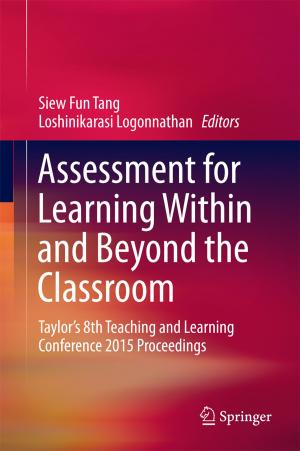Disciplinary Intuitions and the Design of Learning Environments
Nonfiction, Reference & Language, Education & Teaching, Educational Theory, Curricula, Educational Psychology| Author: | ISBN: | 9789812871824 | |
| Publisher: | Springer Singapore | Publication: | October 19, 2014 |
| Imprint: | Springer | Language: | English |
| Author: | |
| ISBN: | 9789812871824 |
| Publisher: | Springer Singapore |
| Publication: | October 19, 2014 |
| Imprint: | Springer |
| Language: | English |
As children, we would have spilt glasses of milk, dropped things, and broken things. As children, therefore, we would have developed intuitions about how the world ‘works’, but we would not necessarily have been able to explain these ‘workings’. It would only have been till we entered formal schooling that we would have learned codifications of canon within each respective discipline, and consequently how to articulate the canon to explain the intuition.
The preceding example was from the natural sciences, but one could just have easily taken an example from, say, the environmental sciences or from the social sciences. Indeed, much of this book does just that, as it seeks to chart the territory of a new theory of learning around Disciplinary Intuitions.
Many of the chapters within draw frequent and explicit linkages to curriculum design, from the premise of the need to go beyond addressing the conceptions of learners, to seeking to understand the substrate upon which these conceptions are founded. The argument is made that this substrate comprises the particular set of lived experiences of each learner, and how – because these lived experiences are as tacit as they are diverse – designing curriculum around misconceptions and preconceptions alone would not lead to enduring understanding from first principles. From this perspective, Disciplinary Intuitions constitute an exciting field at the nexus of learning theories and curriculum design.
As children, we would have spilt glasses of milk, dropped things, and broken things. As children, therefore, we would have developed intuitions about how the world ‘works’, but we would not necessarily have been able to explain these ‘workings’. It would only have been till we entered formal schooling that we would have learned codifications of canon within each respective discipline, and consequently how to articulate the canon to explain the intuition.
The preceding example was from the natural sciences, but one could just have easily taken an example from, say, the environmental sciences or from the social sciences. Indeed, much of this book does just that, as it seeks to chart the territory of a new theory of learning around Disciplinary Intuitions.
Many of the chapters within draw frequent and explicit linkages to curriculum design, from the premise of the need to go beyond addressing the conceptions of learners, to seeking to understand the substrate upon which these conceptions are founded. The argument is made that this substrate comprises the particular set of lived experiences of each learner, and how – because these lived experiences are as tacit as they are diverse – designing curriculum around misconceptions and preconceptions alone would not lead to enduring understanding from first principles. From this perspective, Disciplinary Intuitions constitute an exciting field at the nexus of learning theories and curriculum design.















